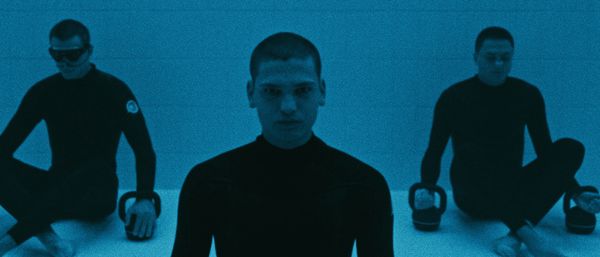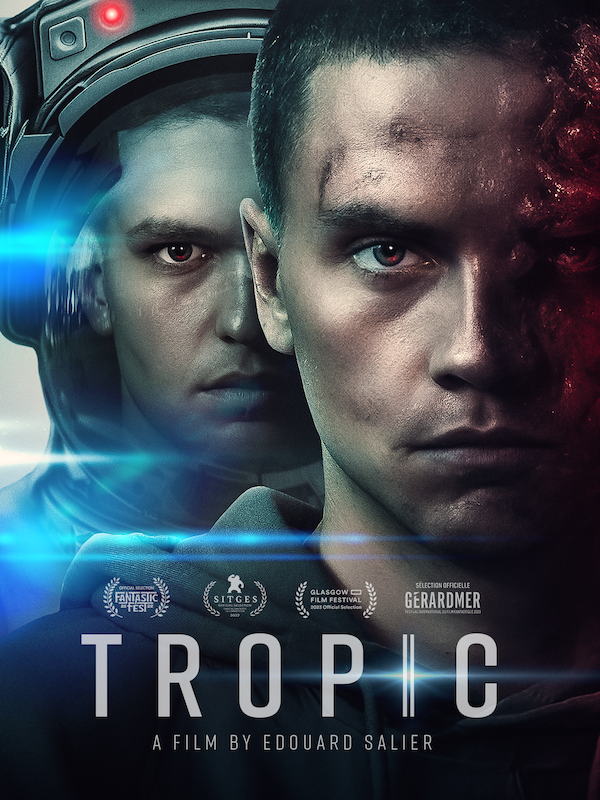Eye For Film >> Movies >> Tropic (2002) Film Review
Tropic
Reviewed by: Jennie Kermode

Holding one’s breath underwater is a little more complicated than it might seem. It requires mental skills, not just physical ones – unless one can keep absolutely calm and regulate one’s bodily processes, it’s impossible to do it for a significant length of time. Tristan (Loius Peres) can do six minutes – still way short of what pearl divers achieve, but impressive for a young Frenchman, and, importantly, one of the best times in the astronaut training group. His brother Lazaro (Pablo Cobo) struggles to do four. Tristan works hard to encourage him, to get him into shape. There are only three places open to France on the pending European mission, and he is determined that they will go together.
There are little hints scattered throughout Edouard Salier’s film to the effect that something is seriously amiss. The year is 2041, but there is talk of this mission being the last chance, which seems to refer to more than just the brothers’ opportunity. Young astronauts are being sent because the voyage will be a long one. There is mention of a colony. At the the beginning of each of the film’s chapters, we look out across a flooded forest in Papua New Guinea, which will, though it’s not mentioned here, be one of the last potential space vehicle launch sites available to humanity if climate change continues unchecked – one of the last places on the equator which is not wholly underwater or too hot to bear.

There is something else going on here, though, which does not pertain to any known catastrophe. Every now and again, strange green shooting stars are seen in the sky, just like the ones in HG Wells’ War Of The Worlds and the one seen across the UK after the death of its most recent queen. Nobody seems to know what they are. When one of them contaminates a lake in which the brothers are practising their diving, Tristan is seriously injured, leaving him physically and cognitively disabled.
The science fiction elements of the film take a back seat for most of the running time in what is essentially a story about how people deal with extreme situations and with a sense of being cheated out of what they are due. Lazaro wrestles with survivor’s guilt and feels caught between fulfilling their joint ambition and not wanting to leave his brother behind. Tristan is still mentally capable enough to understand what has happened to him, and the relentless drive to succeed which he has built up throughout his life becomes toxic, poisoning him with frustration – though at times a little green glint in his eye suggests that there may be more at work.
The brothers’ close relationship becomes strained despite Lazaro’s efforts to help Tristan as Tristan once helped him. A small community of disabled people offers a different way of finding peace in life. Meanwhile, the lads’ Spanish mother, Marta Nieto, abandoned by their father years ago, struggles with the recognition that she has given up her life to support her sons’ dream and now she may lose the rest of it to providing Tristan with care.
There is a lot going on at a thematic level as Salier explores different kinds of masculinity, contrasting the aggressive competition of the young cadets with the balance and control exhibited by their trainers, and inviting us to watch as Lazaro works out which of Tristan’s traits he needs and which he can afford to resist as he continues with his training. Marta’s desperation, which explodes in front of Lazaro only once, reflects something of what all the adults must be feeling in light of those peripheral issues which the obsessive protagonists barely consider. There’s a sense that everybody here is part of a family, sometimes in conflict yet working together for a more positive future which is getting harder and harder to see.
A thoughtful contribution to this year’s Fantastic Fest line-up, since picked up by Sitges, Tropic looks at what happens when the heat is turned up, at the mental effort needed to remain in control.
Reviewed on: 07 Oct 2022

















